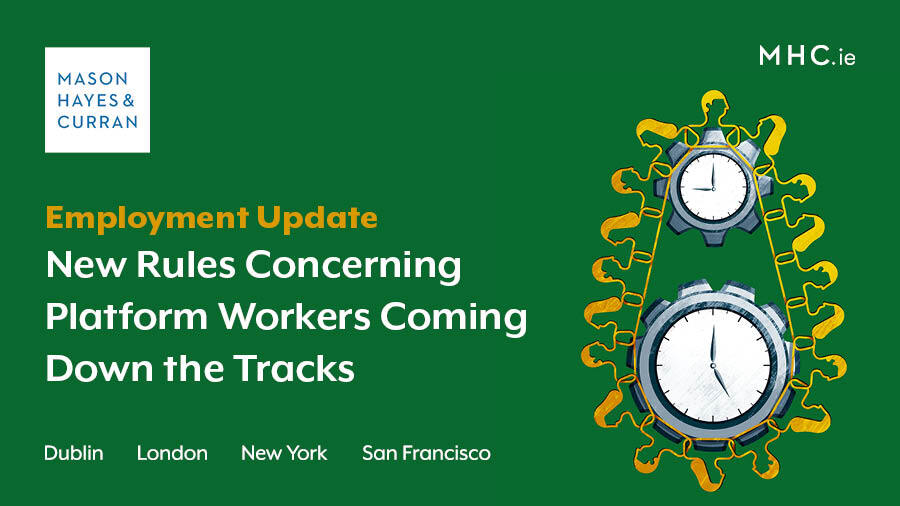New Rules Concerning Platform Workers Coming Down the Tracks

The European Parliament recently approved new rules which are aimed at improving the working conditions of platform workers, the Platform Workers Directive. Our Employment & Benefits team analyses the current position for platform workers in Ireland, and what changes will come in following the Directive.
The European Parliament recently approved the Platform Workers Directive. The new rules are aimed at improving the working conditions of platform workers.
What is platform work?
Platform work is work organised through a digital labour platform and performed in the European Union by an individual on the basis of a contractual relationship between the digital labour platform or an intermediary and the individual. This is irrespective of whether a contractual relationship exists between the individual or an intermediary and the recipient of the service.
Scope of the Directive
This is a highly significant legal update, which, in certain circumstances, introduces a presumption that platform workers are employees, as opposed to self-employed contractors. It also seeks to regulate other aspects of platform work including data processing and regulation of algorithms. The Directive applies to ‘digital labour platforms’ - any natural or legal person providing a service which meets all of the following requirements:
- It is provided, at least in part, at a distance through electronic means, such as a website or a mobile application
- It is provided at the request of a recipient of the service
- It involves, as a necessary and essential component, the organisation of work performed by individuals in return for payment, irrespective of whether that work is performed online or in a certain location
- It involves the use of automated monitoring or decision-making systems
We analyse the current position regarding platform workers in Ireland, and what changes will come in following the Directive.
Current status of platform workers and Domino’s
Platform workers are currently treated as being self-employed in Irish law, as opposed to being classed as employees with the consequent rights and obligations commensurate with employee status. The position regarding self-employed contactors generally, as opposed to the position concerning platform workers, changed in October 2023. This followed the decision of the Supreme Court which found that delivery drivers of Karshan (Midlands) Ltd, trading as Domino's Pizza (Karshan), were employees for the purposes of the Taxes Consolidation Act 1997. We have previously examined the decision in detail.
Crucially, and in a significant departure from previous decisions on determining worker status, the Supreme Court in Karshan decided that excessive focus, or importance, was historically placed on “mutuality of obligation” as one of the fundamental pillars of the employment relationship. Instead, the Supreme Court held that greater significance should be placed on the degree of control under which the worker performed the work. The Supreme Court directed that the question of whether a worker is an employee should be resolved by reference to five specific questions:
- Does the contract involve the exchange of wages or other remuneration for work?
- If so, is the agreement one where the worker is agreeing to provide their own services, and not those of a third party, to the employer?
- If so, does the employer exercise sufficient control over the supposed employee to render the agreement one that is capable of being an employment agreement?
- If requirements 1-3 are met, the decision maker must then determine whether the terms of the contract between employer and worker and the reality of the working arrangements are consistent with a contract of employment, or whether they point to some other form of contract.
- Finally, it should be determined whether there is anything in the particular legislative regime under consideration that requires the court to adjust or supplement any of the foregoing points.
Under the new tests set down by Karshan, it is possible that some platform workers could meet the threshold of an employee. This is particularly the case where factors indicating control are present, for example, where:
- A platform worker cannot turn down work without negative effects
- Their written contractual documentation does not accord with the reality of their working arrangement, or
- They are not permitted to substitute
We recommend that companies review their contractual documentation and arrangements with all self-employed contactors, including platform workers, following the decision in Karshan.
The Directive - employee classification
The Directive defines platform work as any work organised through a digital labour platform and performed in the European Union by an individual on the basis of a contractual relationship between the digital labour platform or an intermediary and the individual. This is irrespective of whether a contractual relationship exists between the individual or an intermediary and the recipient of the service.
Platform workers are defined in the Directive as persons performing platform work who have an employment contract or who are deemed to have an employment relationship as defined by the law, collective agreements or practice in force in the Member States with consideration to the case-law of the Court of Justice.
As such, a person can carry out platform work without meeting the standard of being a platform worker according to the Directive. Certain aspects of the Directive, for example, the restrictions on forms of data processing, will apply to individuals who carry out platform work, even if the person carrying out the work does not meet the threshold of a platform worker.
The Directive introduces a presumption of an employment relationship where facts indicating control and direction are present according to national law, collective agreements, and EU case law. These individuals will be considered platform workers, as opposed to persons who merely carry out platform work. The aim of this presumption is to correct the imbalance of power between the platform and individuals who are performing platform work. The obligation will be on the platform to demonstrate that no employment relationship exists.
Member States must develop guidelines, including concrete and practical recommendations, for digital labour platforms, persons performing platform work and the social partners to understand and implement the legal presumption. EU countries also need to develop guidance to proactively identify, target and pursue digital labour platforms which do not comply with the rules concerning employment status.
Algorithmic management
The Directive seeks to regulate the use of algorithms by platforms in the context of platform workers. According to the Directive, automated decision-making systems cannot make a decision on whether a person can be dismissed. Platforms are obliged to ensure that there is human oversight where important decisions of are made affecting platform workers. Under the Directive, persons performing platform work have the right to obtain an explanation from the digital labour platform for any decision taken or supported by an automated decision-making system without undue delay.
Platforms are required to increase transparency about how algorithms work, to include how a platform worker’s behaviours will affect automated systems and the decisions made by automated systems, to include the provision of information on how the algorithms will be used to persons performing platform work, platform workers' representatives and, upon request, competent national authorities.
Data processing restrictions
The Directive restricts data processing of certain types of personal data, such as personal beliefs, psychological state, and health-related data. There are also restrictions on the processing of private exchanges with colleagues. Platforms are not permitted to collect data when the person performing platform work is not offering or performing platform work. The restrictions on data processing must apply to all persons performing platform work from the start of the recruitment or selection procedure. Platforms are also required to carry out data protection impact assessments regarding persons performing platform work.
There are other obligations laid down in the Directive relating to health & safety and information & consultation.
Comment
As an immediate step, companies who engage persons via platforms should review their contractual documentation, along with their practical working arrangements to ensure that these persons do not meet the threshold for an employee under Karshan. Companies who are engaging persons to undertake platform work should also consider the obligations from a data processing and algorithmic management perspective which will arise in the coming years as a direct result of the Directive.
For more information about the Directive and how it may impact your business operations, contact a member of our Employment Law & Benefits team.
The content of this article is provided for information purposes only and does not constitute legal or other advice.
Share this:




